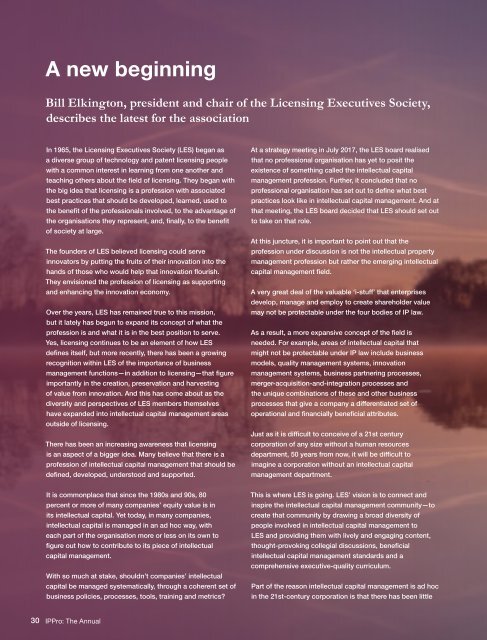IPPro The Annual 2018/19
The beating heart of the world is reaching new heights in innovation, with technology coming to the forefront in 2018 as an enabler of efficiency and automation. In the intellectual property industry, artificial intelligence, machine learning, and blockchain are beginning to shape the burgeoning technology services landscape, and exciting opportunities for both inventors and law firms alike are beginning to present themselves. However recent regulation, such as the EU’s General Data Protection Regulation has drawn a line in the sand for enforcers, resulting in far-reaching consequences across continents, and leaving brands open to attacks from those wanting to hide behind anonymity on the internet. All this, and more, is discussed inside IPPro: The Annual, which features comment and analysis from the world’s leading IP associations. We hope you like its new coat of paint and, as ever, if you have any feedback or suggestions, don’t hesitate to get in touch.
The beating heart of the world is reaching new heights in innovation, with technology coming to the forefront in 2018 as an enabler of efficiency and automation.
In the intellectual property industry, artificial intelligence, machine learning, and blockchain are beginning to shape the burgeoning technology services landscape, and exciting opportunities for both inventors and law firms alike are beginning to present themselves.
However recent regulation, such as the EU’s General Data Protection Regulation has drawn a line in the sand for enforcers, resulting in far-reaching consequences across continents, and leaving brands open to attacks from those wanting to hide behind anonymity on the internet.
All this, and more, is discussed inside IPPro: The Annual, which features comment and analysis from the world’s leading IP associations. We hope you like its new coat of paint and, as ever, if you have any feedback or suggestions, don’t hesitate to get in touch.
You also want an ePaper? Increase the reach of your titles
YUMPU automatically turns print PDFs into web optimized ePapers that Google loves.
A new beginning<br />
Bill Elkington, president and chair of the Licensing Executives Society,<br />
describes the latest for the association<br />
In <strong>19</strong>65, the Licensing Executives Society (LES) began as<br />
a diverse group of technology and patent licensing people<br />
with a common interest in learning from one another and<br />
teaching others about the field of licensing. <strong>The</strong>y began with<br />
the big idea that licensing is a profession with associated<br />
best practices that should be developed, learned, used to<br />
the benefit of the professionals involved, to the advantage of<br />
the organisations they represent, and, finally, to the benefit<br />
of society at large.<br />
<strong>The</strong> founders of LES believed licensing could serve<br />
innovators by putting the fruits of their innovation into the<br />
hands of those who would help that innovation flourish.<br />
<strong>The</strong>y envisioned the profession of licensing as supporting<br />
and enhancing the innovation economy.<br />
Over the years, LES has remained true to this mission,<br />
but it lately has begun to expand its concept of what the<br />
profession is and what it is in the best position to serve.<br />
Yes, licensing continues to be an element of how LES<br />
defines itself, but more recently, there has been a growing<br />
recognition within LES of the importance of business<br />
management functions—in addition to licensing—that figure<br />
importantly in the creation, preservation and harvesting<br />
of value from innovation. And this has come about as the<br />
diversity and perspectives of LES members themselves<br />
have expanded into intellectual capital management areas<br />
outside of licensing.<br />
<strong>The</strong>re has been an increasing awareness that licensing<br />
is an aspect of a bigger idea. Many believe that there is a<br />
profession of intellectual capital management that should be<br />
defined, developed, understood and supported.<br />
At a strategy meeting in July 2017, the LES board realised<br />
that no professional organisation has yet to posit the<br />
existence of something called the intellectual capital<br />
management profession. Further, it concluded that no<br />
professional organisation has set out to define what best<br />
practices look like in intellectual capital management. And at<br />
that meeting, the LES board decided that LES should set out<br />
to take on that role.<br />
At this juncture, it is important to point out that the<br />
profession under discussion is not the intellectual property<br />
management profession but rather the emerging intellectual<br />
capital management field.<br />
A very great deal of the valuable ‘i-stuff’ that enterprises<br />
develop, manage and employ to create shareholder value<br />
may not be protectable under the four bodies of IP law.<br />
As a result, a more expansive concept of the field is<br />
needed. For example, areas of intellectual capital that<br />
might not be protectable under IP law include business<br />
models, quality management systems, innovation<br />
management systems, business partnering processes,<br />
merger-acquisition-and-integration processes and<br />
the unique combinations of these and other business<br />
processes that give a company a differentiated set of<br />
operational and financially beneficial attributes.<br />
Just as it is difficult to conceive of a 21st century<br />
corporation of any size without a human resources<br />
department, 50 years from now, it will be difficult to<br />
imagine a corporation without an intellectual capital<br />
management department.<br />
It is commonplace that since the <strong>19</strong>80s and 90s, 80<br />
percent or more of many companies’ equity value is in<br />
its intellectual capital. Yet today, in many companies,<br />
intellectual capital is managed in an ad hoc way, with<br />
each part of the organisation more or less on its own to<br />
figure out how to contribute to its piece of intellectual<br />
capital management.<br />
With so much at stake, shouldn’t companies’ intellectual<br />
capital be managed systematically, through a coherent set of<br />
business policies, processes, tools, training and metrics?<br />
This is where LES is going. LES’ vision is to connect and<br />
inspire the intellectual capital management community—to<br />
create that community by drawing a broad diversity of<br />
people involved in intellectual capital management to<br />
LES and providing them with lively and engaging content,<br />
thought-provoking collegial discussions, beneficial<br />
intellectual capital management standards and a<br />
comprehensive executive-quality curriculum.<br />
Part of the reason intellectual capital management is ad hoc<br />
in the 21st-century corporation is that there has been little<br />
30 <strong>IPPro</strong>: <strong>The</strong> <strong>Annual</strong>





